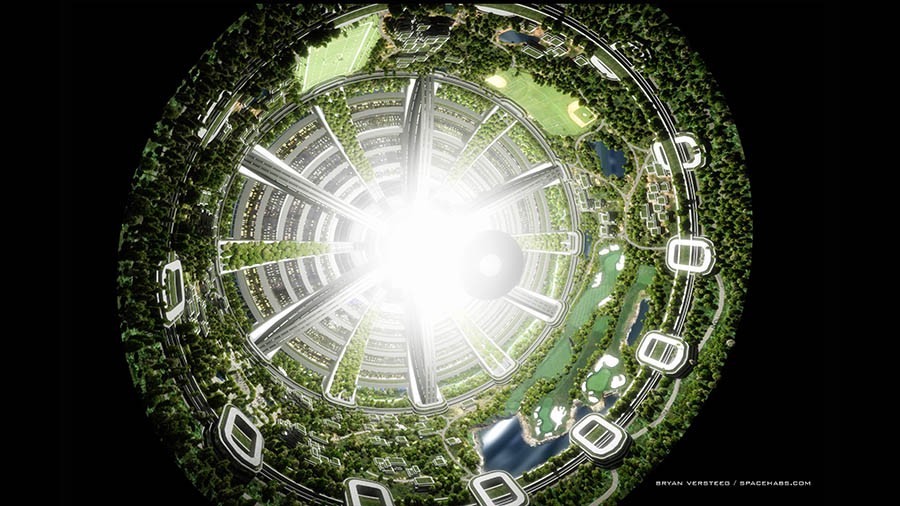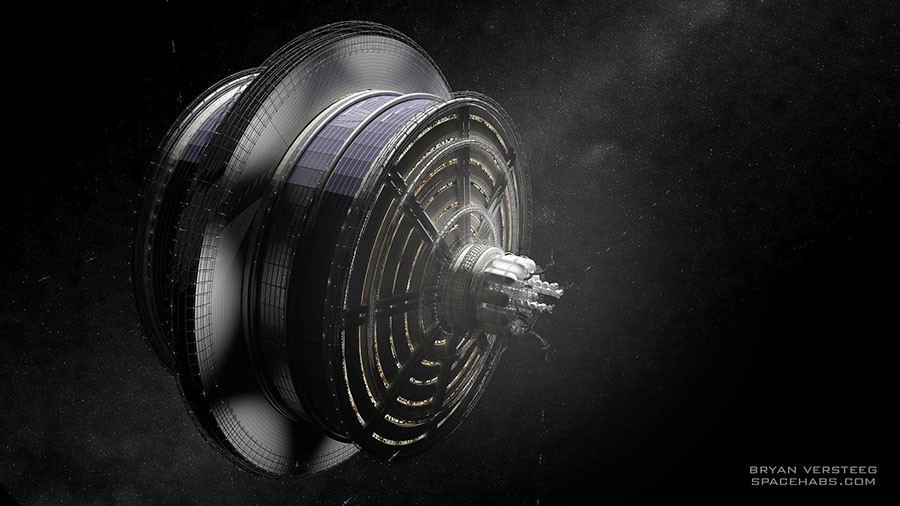It’s a constant possibility that an asteroid in the right place could leave Earth uninhabitable to humans. Lucky for us, researchers have already started hammering out the details of space colonies where we could seek refuge. These colonies have value beyond a dramatic doomsday scenario, helping us expand the scope of our low-gravity experiments; researchers on the International Space Station have used micro-gravity to make unique discoveries in areas from DNA analysis to the physics of water. Preliminary colonies will also help human beings “practice” the skills required to live in outer space, for a future when that might be more common.
The United States’ most recent full-fledged design for a space colony is the Kalpana One, named for Kalpana Chawla, an Indian-American astronaut who died in the 2003 Columbia Space Shuttle crash. San Jose State University researcher Al Globus is still refining the project, which his team developed independent of the National Aeronautics and Space Administration. Recently, Globus has even begun to probe the psychology of space colony living — they’re studying whether potential space cadets would be willing to live in the tiny rooms that will compose these anticipated colonies.
Pacific Standard spoke to Nitin Arora, Globus’ colleague at Kalpana One and a systems engineer at NASA’s Jet Propulsion Laboratory, about what makes a good space colony — and whether babies born in space will ever feel homesick for Earth.

So what do you do now for NASA’s Jet PropulsionLaboratory?
I actually calculate the trajectories for spacecraft. Say you want to go to Jupiter, how would you go? When will you launch, how would you launch, how would the space craft travel? That’s one of my jobs. The other job is to design the spacecraft for the mission.

(Photo: Bryan Versteeg)
Why develop a space colony anyway?
Initially one thought was, if humanity is going to survive in the future, we have to think about how to live off of the Earth. Because at some point it might be: Either we get struck by an asteroid, or we’ll have some other big problem which might lead to the deaths of a lot of people. So we need to figure out how to live off the land. One way is to live on the moon or on Mars, which I think might be a harder problem than to live in space. Because we already know how to make a space station. So it’s building on a capability we already have. It does still have its own challenges to solve. So right now it’s not clear which is the easier way compared to settling on the moon or on Mars, or settling in space. But we need to study both, and the first avenue is living in space.
How is the colony designed? Where would it be?
Originally we designed the colony to be at place called L-5, a special point in space between Earth and the moon where the gravity is more balanced. So you can stay there for a long time without getting thrown off into random directions. The colony rotates, which creates artificial gravity. [In L-5] you can get ample sunlight, and it’s close to the moon, because you might need some material from the moon to act as radiation shielding. [Radiation from charged particles beyond Earth’s atmosphere is a real concern.]But it turns out, over the past four to five years, Al [Globus] has been working on a new design to make it go very close to Earth, in orbit around 500 kilometers from the surface.
But if the colony is so close to Earth, how could it be useful during a disaster?
The first colony will not be in response to an immediate disaster, but more like learning to live off of [Earth’s] land. The second one might be a bigger one, moving toward a bigger settlement. The first one might have 3,000 residents, the next one might have 10,000, and then we go from there.
The right answer for us is having both a colony on the moon, and a colony in space. But we don’t have the money for that, I don’t think. We might eventually — but not right now.
What can people do on the colony?
The colony can have a lot of normal Earth-like things, but also weightless areas, or low-gravity recreation areas, so you have environments for new science experiments, or just having fun. [Watch these astronauts play “micro-gravity chess.”]
How long can the colony last?
It’s basically designed to last forever, unless something bad happens. It’s a place to live your life out. You might have a house there, you can go to live for a few months out of the year and then come back to Earth if you want. Or just stay for the whole year. That was the intent, when we were designing it, to make a permanent rather than temporary solution.
What are some of the biggest threats to a colony in space?

(Photo: Bryan Versteeg)
The first thing might be space debris. If it’s close to Earth, we might have a lot of things impinging on it that can come and crash into the colony and cause a lot of destruction. We would need threat mitigation systems, like moving the colony up and down a little bit, or adding some shielding around it. The second threat might be from radiation, if the station has leakage from the outside. Another might be, what if some systems in the colony failed, which disrupts its rotation and suddenly you have no gravity. People will start floating. Those are engineering challenges which have to be solved. An asteroid can come in and impact the colony. That could also happen to Earth. But a much, much smaller asteroid is required to destroy the colony than to destroy the Earth. And, if the colony is close to Earth, it will have drag on it from Earth’s atmosphere, so we have to correct for drag, after every few years or every few months. So that would require some fuel.
How do you feel about living on a space colony? When would you be willing to do that?
Oh, it sounds fun. I could do it tomorrow.
Forever?
Sure, I would like to come down to Earth once in a while. But it would be fun to live in space. I love space a lot — I’ve grown up watching Star Trek and all that. So it’s just a fantasy of mine. But, of course, I’m sure once I started living there, I’d probably feel a little bit homesick too. It’d be good to come home once in a while. But people who are born in space might not have that same attachment, because they never lived on Earth. For them, the colony is their home.
Escaping to a space colony [after a disaster] is the worst-case scenario. We’re thinking about this, really, from a civilizing perspective. Humans, we are explorers. We like to build new things and explore new worlds, and this is another step to take in that direction. Later on we might use it to save ourselves, but I don’t think that should be the only motivation to develop space colonies.

Armageddon Awareness Day is Pacific Standard’s special report for Earth Day 2016, in which we confront our fears about the apocalypse while celebrating those things that make our planet worthwhile.





